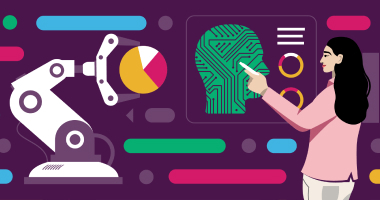Every day thousands of people with disabilities use their keyboards, screen readers and other assistive technologies to move work forward in their digital HQ. That’s why we’re continuously working to improve accessibility in Slack, empowering our users to do the best work of their lives regardless of their abilities or circumstances.
Today, guided by user research and customer feedback, we’re sharing new enhancements to make working in Slack even easier, more intuitive and efficient for all our users, including those with disabilities.
Improved keyboard navigation
From customers using assistive technologies to those who prefer not to use a mouse or trackpad, some users rely primarily on keyboards to get work done in Slack. To help, we’re making the experience of navigating Slack with a keyboard faster, more consistent and more reliable.
Navigate with confidence using F6 and Tab
Slack has dozens of keyboard shortcuts to help people quickly navigate their workspaces. Many of our users who are blind or have low vision often operate their screen readers via a keyboard, and they have asked for better ways to orient themselves within Slack. So we’re introducing a new navigation model designed for speed and consistency that includes new functionality for the F6 and Tab keys.
Pressing the F6 key moves focus between different sections in Slack, and now Tab will move focus within each section. This new system will make it easier to explore previously hard-to-reach parts of Slack’s interface, like the channel header area and the bookmarks bar. Mac users with a Touch Bar can use the Command + Control + Left/Right keys for the same functionality.

“Since I work with people all across the globe, I rely on Slack daily to collaborate with my colleagues. It is important that I can do this efficiently and effectively, so Slack’s new accessibility improvements are a huge step forward for me.”
Scroll up through channels, DMs and threads
Channels and DMs are at the heart of Slack, where users can read messages and interact with their teams. We’ve made that central experience more robust and consistent for keyboard users. Now users can press the Up key to move from the message field to the message list even if they’ve already started composing a message. We’ve also made the experience of pressing the Up key consistent across channels, DMs and threads.
Explore your toolbars with familiar shortcuts
Toolbars within Slack are now more consistent and intuitive. Users can quickly navigate them by using arrow keys, or keyboard shortcuts they’re already familiar with, like Home and End.
Maintain focus as you work
We’ve also improved focus handling to make Slack more reliable and robust for keyboard users. Focus no longer gets lost, even when switching to a new workspace or opening a view that needs a second to load.

“Slack is a model of what usability testing can do to improve the experience for everyone, including those who use assistive technology. I’m impressed by the accessibility team’s creativity, empathy and patience.”
A better experience with screen readers
To help streamline the Slack experience for people using screen readers, we’re introducing a number of design enhancements.
Discover critical information faster
Slack’s redesigned interface is much simpler and tidier, meaning screen readers will no longer read out extra information as users navigate their workspaces. This cuts down on confusion, helping users more quickly understand what’s happening on screen and find the information they need.
Enjoy an improved information hierarchy and better labeling
Users who are blind or have low vision rely on precise, descriptive labels to make sense of Slack. We’ve comprehensively redesigned the way we organize and label Slack’s interface for screen readers to make it more intuitive, with:
- More descriptive names and improved information hierarchy. We’ve changed the labels for each section of the Slack layout from visual metaphors like “top nav” to more straightforward names that better reflect their content and function. The new names also include cues as to each section’s priority, relationship and order relative to other sections. For example, “top nav” became “workspace primary actions.”
- Clearer relationships between components. To make our overall layout clearer for our users who are blind, we’ve created the concept of the “primary view”—the main pane containing your messages and activity—and the “secondary view,” where you can get expanded details about a thread or user profile.
Customize Slack to meet your needs
As different users have different needs, we’re adding new preferences to give customers who use screen readers greater control over their experience. For example, users who are blind can now choose to always leave the sidebar expanded for more consistent navigation. And users of screen readers can choose the order in which a message’s metadata will be announced when reading through a conversation.

“As we navigate this new era of work, we’ve been working alongside users who leverage assistive technologies to build tools that meet their needs. These new enhancements reflect this work and bridge gaps, offering everyone a more pleasant, productive and equitable experience in Slack.”
An ongoing effort to bridge gaps
Inclusive design doesn’t just benefit the 1 billion people around the world experiencing some form of disability; it results in better products for everyone. With our latest updates, we’re making Slack more intuitive, efficient and easy to navigate, creating a more pleasant and productive experience for all our users.
The enhancements we’re announcing today will begin rolling out to all Slack users on August 10, and are just the latest step in our accessibility and inclusivity journey. We look forward to continuing to partner with our users with disabilities to co-create tools that work for them and for all, as we navigate this new era of work together.
To learn more, visit our accessibility page and our Help Center.






